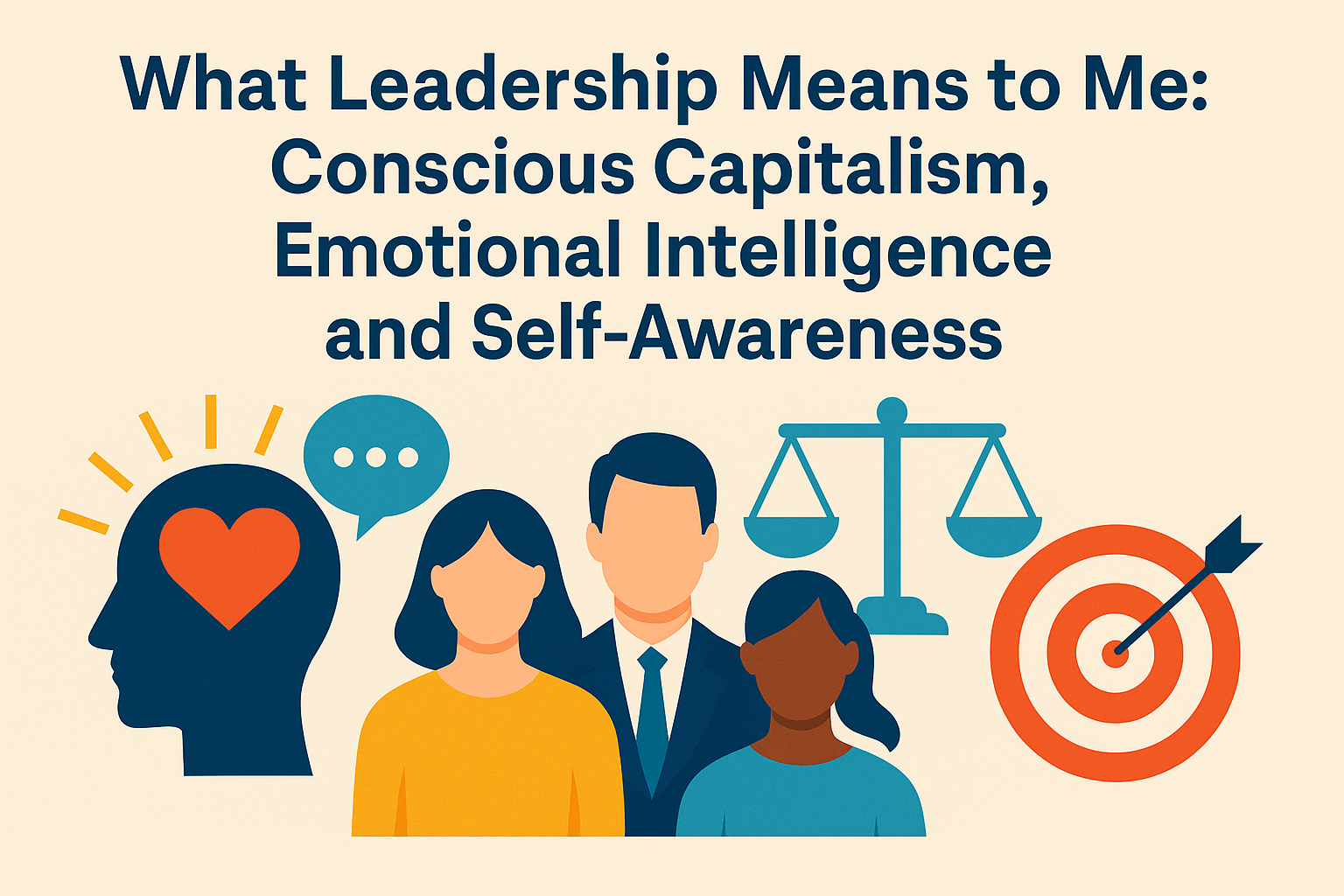Leadership, Conscious Capitalism, Emotional Intelligence, and Self-Awareness
Conscious Capitalism, Grand Canyon University, Leadership, Master's in Business Administration, Organizational Management Conscious Capitalism, emotional intelligence, Leadership, Master's in Business Administration, MBA, organizational behavior, self-awarenessConscious Capitalism: Leading with Purpose
Business doesn’t have to be just about the bottom line. Conscious capitalism is a refreshing way to look at business as a force for good. It’s built on four core tenets:
-
Higher Purpose – A company should have a reason to exist beyond profit. Take Bobbie, for example—a baby formula company born out of a mother’s concern for healthy ingredients. Her mission came first, and the success followed.
-
Stakeholder Orientation – A conscious business considers the needs of all its stakeholders: customers, employees, suppliers, and investors. When businesses treat everyone they interact with respectfully, they build trust and long-term success.
-
Conscious Leadership – Leaders set the tone. A self-serving leader will eventually steer the organization in the wrong direction, no matter how noble the mission. But a conscious leader can transform even the most profit-driven company into something better.
-
Conscious Culture – Culture is everything. In organizations with conscious cultures, people genuinely care about each other and the community. Volunteering and collaboration are woven into the fabric of the workplace, and that’s powerful.
Management Theories: Where It All Began
Understanding leadership today means knowing where it started. Back in the early 1900s, Frederick Taylor introduced Scientific Management, focusing on efficiency and productivity. While it was groundbreaking at the time, it treated workers like machines, ignoring the human element.
In the 1920s, the Human Relations Movement, led by people like Elton Mayo, began to shift the focus. It emphasized morale, communication, and understanding the needs of employees. For the first time, the emotional and social aspects of work were taken seriously. That shift laid the foundation for the people-first leadership we strive for today.
Emotional Intelligence: The Core of Great Leadership and Conscious Capitalism
If I’ve learned one thing about leadership, it’s that emotional intelligence matters—maybe more than anything else. Being able to recognize and manage your own emotions is key, but so is understanding the emotions of others.
Self-awareness is the cornerstone. If you can’t regulate yourself, it’s tough to lead others. But emotional intelligence also means empathy, active listening, and navigating the wide range of moods, behaviors, and personalities that make up any team.
What I Learned About Myself
Through several assessments, I’ve learned a lot about my own strengths and areas for growth:
-
VARK Learning Style – I’m strongly kinesthetic, which means I learn best by doing. I’m hands-on and need to apply what I learn in a practical way. I’m less effective with aural learning, so I know to avoid lecture-heavy formats when possible.
-
Rokeach Values Survey – My top terminal values are freedom, an exciting life, and salvation. Instrumental values like being self-controlled, independent, and ambitious drive me. Right now, achieving freedom is my top priority, but I can see that shifting toward more community-focused goals over time.
-
Cultural Competency – I scored well on cultural awareness, but I’m still growing in how I apply that awareness. I appreciate different cultures but want to remain grounded in my Christian worldview. Leading a diverse team means being respectful and open without losing sight of my own values.
What these assessments really showed me is that leadership takes work—both professionally and personally. It’s about knowing yourself and being able to connect with others, no matter where they’re from or what they believe.
Why It All Matters
At the end of the day, creating a productive workplace starts with making people feel valued. If individuals aren’t happy or don’t feel seen, they won’t stick around. And if there’s a disconnect between personal values, team dynamics, and company goals, things fall apart fast.
The best organizations align individual purpose with collective mission. That’s when real growth happens—both for people and the business itself.
Final Thoughts On Conscious Capitalism
Leadership is a blend of theory, heart, and self-awareness. From early management practices to the movement toward conscious capitalism, one thing is clear: leadership today demands emotional intelligence, cultural sensitivity, and a higher purpose.
I’m still growing, still learning, and still figuring out what kind of leader I want to be. But I know this much—when you lead with empathy and integrity, people notice. And when your mission drives your business, success tends to follow.
Sources:
-
Conscious Capitalism: Liberating the Heroic Spirit of Business – Mackey, J., & Sisodia, R. (2014)
-
The Human Problems of an Industrial Civilization – Mayo, E. (2010)
-
The Principles of Scientific Management – Taylor, F. W. (1993)
-
“Basics of Human Relations Management Theory.” business.com
